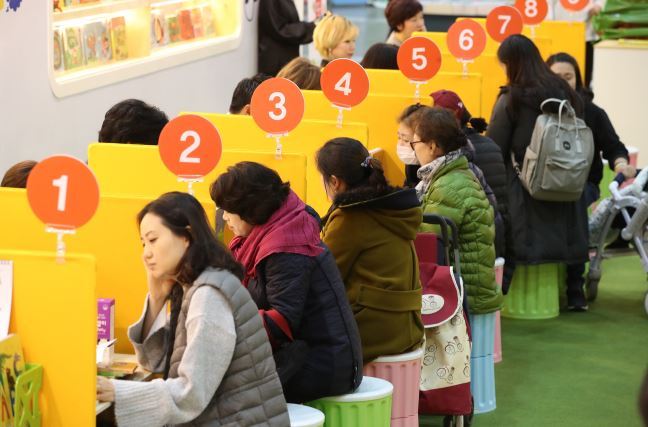Care for unborn babies, called “taegyo” in Korean, exists both in Asian and Western countries to give birth to a healthy child. But prenatal care takes on a much more ambitious spin in South Korea, with the focus largely on educating – literally -- the fetus in pursuit of having “smarter kids.”
“The very first and repetitive phrase that I heard from both the in-laws and my parents during my pregnancy was ‘do this and that to give birth to a smart baby,’” said Kwon Mi-young, a 36-year-old working mom living in Seoul.
Kwon’s mother-in-law had claimed eating domestically grown black beans helps the growth of her son’s brain in the womb. So for months, she had to make black bean milk to drink every morning at her mother-in-law’s demand, she said.
Kim Hae-jin, a 34 year-old working as a freelancer, said she enrolled into a graduate school when Kim got pregnant four years ago.
“I had heard that babies grow smart if their moms study hard when they are in the womb,” Kim said. “I can’t tell if it’s true or not yet, because my son is still young.”
 |
Pre-moms and mothers consult educational programs for thier kids at a fair in Seoul in November. (Yonhap) |
Studying mathematics has become a popular taegyo option recently, as some moms who believe high math scores are crucial for academic success of their children.
“Some say what the fetus learns during the nine months in the womb is much more important than what he or she learns for 10 years after birth,” said a woman who introduced herself as Chongchong’s mom on an internet community of pre-moms. “So I bought a math textbook for fifth graders and started solving the problems since the 20th week of pregnancy.”
She believes that the brain stimulation in the mother from solving math problems in turn stimulates the baby’s brain in the womb. Some mothers choose English for taegyo for similar reasons, she added.
Meanwhile, expectant mothers in Europe and the United States seem to have different perspectives of prenatal care.
Angie Lee, a Korean mother of a 3-year-old boy, who is raising the child in London, said prenatal education in Britain is mainly focused on maintaining the mom’s physical and mental health in preparation for birth.
“I have rarely heard of anything similar to Korea’s math taegyo or English taegyo in England, or something that mothers do to make their babies smart,” Lee said. “Most moms here regularly take a walk in parks, listen to music and spend time at museums.”
Prenatal education programs in the UK are mostly about how to deal with labor pains and breastfeeding after birth, she said.
“I’ve seen some mothers try to sing lullabies or play music regularly as the government’s health organization says prenatal exposure to music is important,” Lee said.
The UK’s National Health Service highlights that prenatal exposure to music may influence brain development at a critical period for the development of the auditory system.
Korean moms living in the United States and Canada agree with Lee saying it is not common to see American or Canadian moms who are doing taegyo in the same way as Korean moms.
“Canadian moms seem like they are paying more attention to their health,” said Huh In-kyoung, a mother of 2-year-old daughter in Toronto. “I am not familiar with taegyo either.”
A few studies have been conducted to test the effectiveness of taegyo practices.
One study published in 2013 in Korea – by Kim Sun-ju at department of psychiatry at Kyung Hee University School of Medicine and et.al – said some of modern taegyo activities such as physical exercises, musical lessons and religious rituals do make changes in the maternal-fetal attachment.
“Medical evidence shows stress, anxiety and poor health of pregnant women negatively affect the physical and intelligence development of the fetus,” the authors said.
“Not all of the modern taegyo practices have scientific logic that explains effectiveness, but many of them are part of domestic science and do have effects on the development of the fetus.”
But experts point out that education and other practices that become excessive can lead to stress for the preparing mothers and become counterproductive.
By Song Su-hyun (
song@heraldcorp.com)







![[Today’s K-pop] Blackpink’s Jennie, Lisa invited to Coachella as solo acts](http://res.heraldm.com/phpwas/restmb_idxmake.php?idx=644&simg=/content/image/2024/11/21/20241121050099_0.jpg)
